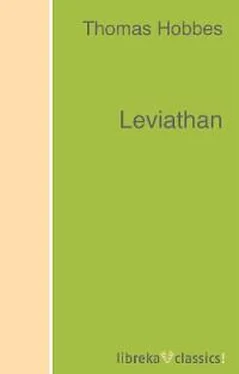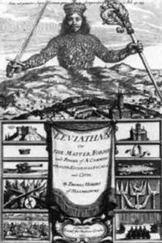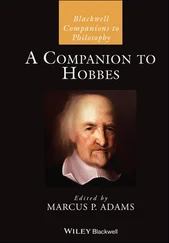Thomas Hobbes - Leviathan
Здесь есть возможность читать онлайн «Thomas Hobbes - Leviathan» — ознакомительный отрывок электронной книги совершенно бесплатно, а после прочтения отрывка купить полную версию. В некоторых случаях можно слушать аудио, скачать через торрент в формате fb2 и присутствует краткое содержание. Жанр: unrecognised, на английском языке. Описание произведения, (предисловие) а так же отзывы посетителей доступны на портале библиотеки ЛибКат.
- Название:Leviathan
- Автор:
- Жанр:
- Год:неизвестен
- ISBN:нет данных
- Рейтинг книги:5 / 5. Голосов: 1
-
Избранное:Добавить в избранное
- Отзывы:
-
Ваша оценка:
- 100
- 1
- 2
- 3
- 4
- 5
Leviathan: краткое содержание, описание и аннотация
Предлагаем к чтению аннотацию, описание, краткое содержание или предисловие (зависит от того, что написал сам автор книги «Leviathan»). Если вы не нашли необходимую информацию о книге — напишите в комментариях, мы постараемся отыскать её.
libreka classics – These are classics of literary history, reissued and made available to a wide audience.
Immerse yourself in well-known and popular titles!
Leviathan — читать онлайн ознакомительный отрывок
Ниже представлен текст книги, разбитый по страницам. Система сохранения места последней прочитанной страницы, позволяет с удобством читать онлайн бесплатно книгу «Leviathan», без необходимости каждый раз заново искать на чём Вы остановились. Поставьте закладку, и сможете в любой момент перейти на страницу, на которой закончили чтение.
Интервал:
Закладка:
Sometimes a man knows a place determinate, within the compasse whereof his is to seek; and then his thoughts run over all the parts thereof, in the same manner, as one would sweep a room, to find a jewell; or as a Spaniel ranges the field, till he find a sent; or as a man should run over the alphabet, to start a rime.
Prudence
Sometime a man desires to know the event of an action; and then he thinketh of some like action past, and the events thereof one after another; supposing like events will follow like actions. As he that foresees what wil become of a Criminal, re-cons what he has seen follow on the like Crime before; having this order of thoughts, The Crime, the Officer, the Prison, the Judge, and the Gallowes. Which kind of thoughts, is called Foresight, and Prudence, or Providence; and sometimes Wisdome; though such conjecture, through the difficulty of observing all circumstances, be very fallacious. But this is certain; by how much one man has more experience of things past, than another; by so much also he is more Prudent, and his expectations the seldomer faile him. The Present onely has a being in Nature; things Past have a being in the Memory onely, but things To Come have no being at all; the Future being but a fiction of the mind, applying the sequels of actions Past, to the actions that are Present; which with most certainty is done by him that has most Experience; but not with certainty enough. And though it be called Prudence, when the Event answereth our Expectation; yet in its own nature, it is but Presumption. For the foresight of things to come, which is Providence, belongs onely to him by whose will they are to come. From him onely, and supernaturally, proceeds Prophecy. The best Prophet naturally is the best guesser; and the best guesser, he that is most versed and studied in the matters he guesses at: for he hath most Signes to guesse by.
Signes
A Signe, is the Event Antecedent, of the Consequent; and contrarily, the Consequent of the Antecedent, when the like Consequences have been observed, before: And the oftner they have been observed, the lesse uncertain is the Signe. And therefore he that has most experience in any kind of businesse, has most Signes, whereby to guesse at the Future time, and consequently is the most prudent: And so much more prudent than he that is new in that kind of business, as not to be equalled by any advantage of naturall and extemporary wit: though perhaps many young men think the contrary.
Neverthelesse it is not Prudence that distinguisheth man from beast. There be beasts, that at a year old observe more, and pursue that which is for their good, more prudently, than a child can do at ten.
Conjecture Of The Time Past
As Prudence is a Praesumtion of the Future, contracted from the Experience of time Past; So there is a Praesumtion of things Past taken from other things (not future but) past also. For he that hath seen by what courses and degrees, a flourishing State hath first come into civill warre, and then to ruine; upon the sights of the ruines of any other State, will guesse, the like warre, and the like courses have been there also. But his conjecture, has the same incertainty almost with the conjecture of the Future; both being grounded onely upon Experience.
There is no other act of mans mind, that I can remember, naturally planted in him, so, as to need no other thing, to the exercise of it, but to be born a man, and live with the use of his five Senses. Those other Faculties, of which I shall speak by and by, and which seem proper to man onely, are acquired, and encreased by study and industry; and of most men learned by instruction, and discipline; and proceed all from the invention of Words, and Speech. For besides Sense, and Thoughts, and the Trayne of thoughts, the mind of man has no other motion; though by the help of Speech, and Method, the same Facultyes may be improved to such a height, as to distinguish men from all other living Creatures.
Whatsoever we imagine, is Finite. Therefore there is no Idea, or conception of anything we call Infinite. No man can have in his mind an Image of infinite magnitude; nor conceive the ends, and bounds of the thing named; having no Conception of the thing, but of our own inability. And therefore the Name of GOD is used, not to make us conceive him; (for he is Incomprehensible; and his greatnesse, and power are unconceivable;) but that we may honour him. Also because whatsoever (as I said before,) we conceive, has been perceived first by sense, either all at once, or by parts; a man can have no thought, representing any thing, not subject to sense. No man therefore can conceive any thing, but he must conceive it in some place; and indued with some determinate magnitude; and which may be divided into parts; nor that any thing is all in this place, and all in another place at the same time; nor that two, or more things can be in one, and the same place at once: for none of these things ever have, or can be incident to Sense; but are absurd speeches, taken upon credit (without any signification at all,) from deceived Philosophers, and deceived, or deceiving Schoolemen.
CHAPTER IV. OF SPEECH
Originall Of Speech
The Invention of Printing, though ingenious, compared with the invention of Letters, is no great matter. But who was the first that found the use of Letters, is not known. He that first brought them into Greece, men say was Cadmus, the sonne of Agenor, King of Phaenicia. A profitable Invention for continuing the memory of time past, and the conjunction of mankind, dispersed into so many, and distant regions of the Earth; and with all difficult, as proceeding from a watchfull observation of the divers motions of the Tongue, Palat, Lips, and other organs of Speech; whereby to make as many differences of characters, to remember them. But the most noble and profitable invention of all other, was that of Speech, consisting of Names or Apellations, and their Connexion; whereby men register their Thoughts; recall them when they are past; and also declare them one to another for mutuall utility and conversation; without which, there had been amongst men, neither Common-wealth, nor Society, nor Contract, nor Peace, no more than amongst Lyons, Bears, and Wolves. The first author of Speech was GOD himselfe, that instructed Adam how to name such creatures as he presented to his sight; For the Scripture goeth no further in this matter. But this was sufficient to direct him to adde more names, as the experience and use of the creatures should give him occasion; and to joyn them in such manner by degrees, as to make himselfe understood; and so by succession of time, so much language might be gotten, as he had found use for; though not so copious, as an Orator or Philosopher has need of. For I do not find any thing in the Scripture, out of which, directly or by consequence can be gathered, that Adam was taught the names of all Figures, Numbers, Measures, Colours, Sounds, Fancies, Relations; much less the names of Words and Speech, as Generall, Speciall, Affirmative, Negative, Interrogative, Optative, Infinitive, all which are usefull; and least of all, of Entity, Intentionality, Quiddity, and other significant words of the School.
But all this language gotten, and augmented by Adam and his posterity, was again lost at the tower of Babel, when by the hand of God, every man was stricken for his rebellion, with an oblivion of his former language. And being hereby forced to disperse themselves into severall parts of the world, it must needs be, that the diversity of Tongues that now is, proceeded by degrees from them, in such manner, as need (the mother of all inventions) taught them; and in tract of time grew every where more copious.
The Use Of Speech
Интервал:
Закладка:
Похожие книги на «Leviathan»
Представляем Вашему вниманию похожие книги на «Leviathan» списком для выбора. Мы отобрали схожую по названию и смыслу литературу в надежде предоставить читателям больше вариантов отыскать новые, интересные, ещё непрочитанные произведения.
Обсуждение, отзывы о книге «Leviathan» и просто собственные мнения читателей. Оставьте ваши комментарии, напишите, что Вы думаете о произведении, его смысле или главных героях. Укажите что конкретно понравилось, а что нет, и почему Вы так считаете.












